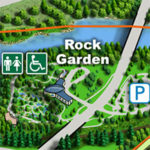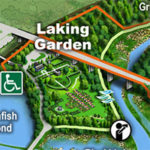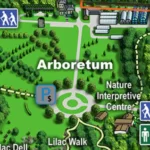| Membership | Price (+HST) |
|---|---|
| Single | $85/year |
| Single Plus | $120/year |
| Family | $130/year |
| Family Plus | $175/year |
| Contributing | $300/year |
| Supporting | $600/year |
| Sustaining | $1,000/year |
| Benefactor's Circle | $2,500/year |
| Director's Circle | $5,000/year |
| President's Circle | $10,000/year |
Put the rake down. Your garden, and local wildlife, will thank you
By Jessica Veter, Volunteer, Royal Botanical Gardens.
I have been gardening since April and, frankly, I’m exhausted. I’ve dug a set of stairs into a slippery slope, planted 12 trees, amended soil, wept over rabbit damage, accidentally pulled out baby Hemerocallis, hauled rainwater, chased chickens out of my apple trees, gathered salad greens, watched over butterfly chrysalides and more.
It’s been great. But I’m done. I’m ready to light a fire, drink tea and – at last – pick up the book I started in March.
Thankfully, my garden is happy with my desire to quit, and so is the local wildlife. I won’t touch a rake this fall, nor my loppers or secateurs other than to clean them and put them away. I don’t clean my garden at all, and I’m recommending you don’t either.
Our gardens play an important part in supporting wildlife throughout fall and winter. When we clear away old seed heads and dried-up stalks of perennials, we remove habitat. Important pollinators such as native bees seek out leaf litter to burrow under. Ladybugs and other insect predators also hibernate in leaf litter, or congregate at the base of herbaceous stems (sometimes even in the stems!). If we remove their habitat by tidying up, we remove these beneficial insects from our gardens. That’s a setback for them, and for us.
Winter gardens provide shelter for butterflies that don’t migrate. Mourning cloaks, tortoiseshells and others seek out wood piles, tree bark and leaf litter.

Birds also appreciate a ‘messy’ garden. Those hibernating insects are an essential food source for them. Birds keep insect population under control, ensuring a healthy balance year after year. We should be encouraging them to stick around.
And aesthetically? I’d much rather look out my window at echinacea seed heads wearing wee caps of snow than at a flat, barren landscape.
Come April, I find that winter has done most of the clean-up for me. A pass-over with the rake is usually all I need to do to get the beds ready for a new season of gardening. Which leaves more time for tea, and reading, and chasing the chickens out of the rhubarb.
More from the RBG Blog
Check out RBG’s blog for announcements, articles, and more from Canada’s largest botanical garden.
Want to be sure you hear first? Sign up for our weekly e-newsletter to hear about upcoming events, weekend activities, articles, and more!












